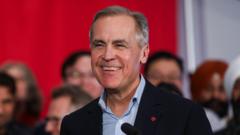The inauguration of Mikheil Kavelashvili signals a significant shift in Georgia's political landscape amid allegations of electoral fraud and growing tensions with the West.
Georgia Shifts Political Allegiance as Conservative President Mikheil Kavelashvili Takes Office

Georgia Shifts Political Allegiance as Conservative President Mikheil Kavelashvili Takes Office
As Georgia embraces a new conservative leadership, the country moves away from its pro-Western stance towards closer ties with Russia and China.
On December 29, 2024, Georgia witnessed a significant political transformation as Mikheil Kavelashvili, a former soccer star and vocal critic of the West, was sworn in as the country’s new president. This transition in leadership is marked by a growing rift between Georgia and its traditional Western allies, amid rising influences from Russia and China.
Kavelashvili’s inauguration took place in a predominantly vacant parliamentary chamber, as members from four opposition parties boycotted the event following the controversial parliamentary elections earlier that October, which they claimed were rigged. The election, along with Kavelashvili's presidency, highlights a pivotal change for Georgia, which has long been seen as a pro-Western bastion among the nations emerging from the Soviet Union.
During his inaugural speech, Kavelashvili emphasized the need for the nation to navigate complex challenges with measured consideration and strategic thinking. His presidency comes on the heels of heightened tensions with the United States, following the imposition of sanctions on Georgian oligarch Bidzina Ivanishvili, who is perceived as possessing substantial influence in the country’s politics.
The political crisis in Georgia has intensified, particularly after the government’s announcement to postpone EU accession talks until 2028—an initiative that holds significant importance to many Georgians seeking integration with Europe. As the newly inaugurated president embarks on his leadership journey, observers will be closely monitoring how Kavelashvili’s administration will navigate these tumultuous political realities and reshape Georgia’s position on the global stage.
Kavelashvili’s inauguration took place in a predominantly vacant parliamentary chamber, as members from four opposition parties boycotted the event following the controversial parliamentary elections earlier that October, which they claimed were rigged. The election, along with Kavelashvili's presidency, highlights a pivotal change for Georgia, which has long been seen as a pro-Western bastion among the nations emerging from the Soviet Union.
During his inaugural speech, Kavelashvili emphasized the need for the nation to navigate complex challenges with measured consideration and strategic thinking. His presidency comes on the heels of heightened tensions with the United States, following the imposition of sanctions on Georgian oligarch Bidzina Ivanishvili, who is perceived as possessing substantial influence in the country’s politics.
The political crisis in Georgia has intensified, particularly after the government’s announcement to postpone EU accession talks until 2028—an initiative that holds significant importance to many Georgians seeking integration with Europe. As the newly inaugurated president embarks on his leadership journey, observers will be closely monitoring how Kavelashvili’s administration will navigate these tumultuous political realities and reshape Georgia’s position on the global stage.




















